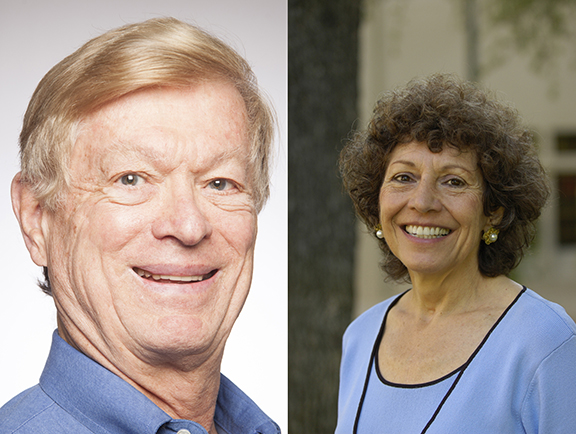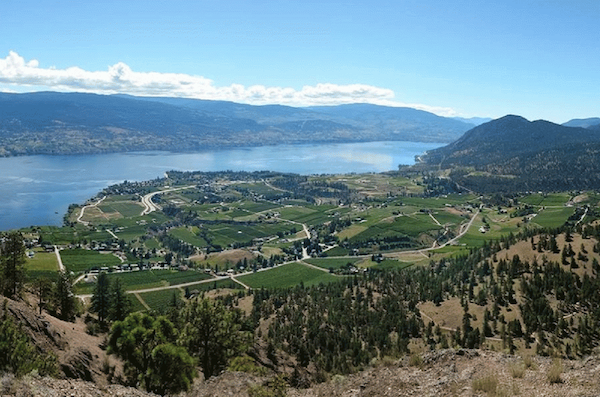
From our extensive research in California and other major wine regions of the world, we have learned that newer and growing wine areas of distinction may offer greater opportunity for qualified women wanting to break into the traditionally male-dominated field of winemaking. The recent attention being given to the Okanagan Valley and its wines inspired us to travel there to meet with its lead winemakers who are women. Our goal in visiting was to learn about their presence as winemakers in the region, colloquially referred to as "the Okanagan," and the career paths that led them there.
(The opening photo is a view overlooking the Okanagan Lake)
The Okanagan Valley and Its History: A Brief Overview
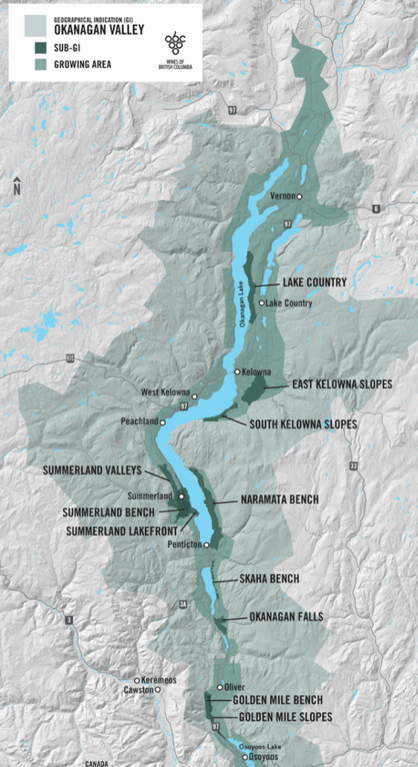 The Okanagan Valley, located in Canada's westernmost province, is well known as a wine region growing in importance and visibility. One of nine distinct wine regions in British Columbia (BC), it lies 170 miles northeast of Vancouver. The valley is currently home to some 222 licensed grape wineries spread over its narrow 124-mile length. The vineyards typically receive over two hours more sunlight during the peak growing season than the Sonoma and Napa Valleys, despite being over 750 miles north of these popular California winemaking areas. As another point of reference, the Okanagan has the same latitude as the Champagne region of France.
The Okanagan Valley, located in Canada's westernmost province, is well known as a wine region growing in importance and visibility. One of nine distinct wine regions in British Columbia (BC), it lies 170 miles northeast of Vancouver. The valley is currently home to some 222 licensed grape wineries spread over its narrow 124-mile length. The vineyards typically receive over two hours more sunlight during the peak growing season than the Sonoma and Napa Valleys, despite being over 750 miles north of these popular California winemaking areas. As another point of reference, the Okanagan has the same latitude as the Champagne region of France.
The valley is semi-arid, annually averaging less than 12 inches of moisture because of the "rain shadow" cast by the Cascade and Coastal Ranges, and experiences temperatures ranging from -20°F in the winter to over 90°F in the summer. A chain of lakes, major ones being Okanagan—by far the largest—Skaha, and Osoyoos, lines the valley from north to south, and they serve to moderate its climate. As can be seen from the map, the northern portion of the valley is marked by Lake Country and its southern end is Osoyoos, a town just north of the Canada-United States (US) border.
Wines of the Okanagan
Wine has been crafted in the Okanagan Valley since the mid-19th century. The wines were mostly made from various fruits or from hybrid and Vitis labrusca cultivars (e.g., Concord grape). The imposition of the North American Free Trade Agreement (NAFTA) in the 1980s prompted the Canadian government to provide grants to wine-grape growers to uproot their hybrid and Vitis labrusca cultivars and replace them with varieties of the Vitis vinifera family, the wine grapes mostly used today (e.g., Cabernet Sauvignon and Riesling). The region is now home to over 60 varieties of vinifera grapes that yield still, sparkling, fortified, and dessert wines. Many fruit orchards remain, though vineyards have been steadily replacing them as emphasis on wine production has increased. The wineries themselves increasingly own acreage once owned by independent growers.
A further consequence of NAFTA was the establishment of two administrative organizations for the BC wine industry. One of these, the British Columbia Wine Authority, oversees wine standards in the province through the Vintners Quality Alliance (VQA). This designation, limited to wines crafted exclusively from fruit produced in BC, is analogous to the Appellation d'Origine Controlee (AOC) and Denominazione di Origine Controllata (DOC) systems that define wine regions in France and Italy, respectively. The British Columbia Wine Institute (BCWI), the second organization—currently known as Wine Growers British Columbia—represents the approximately 330 wineries across BC, two-thirds of which are located in the Okanagan Valley. This organization's purpose is to provide communications, advocacy, and marketing for the industry. When the BCWI was established in 1990, it included a total of 19 wineries, 17 of which were located in the Okanagan.
Women Winemakers of the Okanagan
Of the original 19 wineries in the BCWI, four (21%) reported a woman as its lead winemaker in 1990, a sizable percentage for the time. All four wineries were located in the Okanagan.
To get a sense of where things stand now, we calculated the current percentage of Okanagan wineries that have a lead women winemaker. It is 20.1%. For comparison, the percentage of wineries having lead women winemakers across all the remaining eight regions of BC is about 10%; for the State of California in the US, it is approximately 14% (See Notes 1 and 2).
The percentage of wineries having a lead woman winemaker for the Okanagan compares favorably with the major wine regions we have studied. That the percentage today is quite similar to that reported in 1990 reflects a continued strong presence of lead women winemakers in what remains a male-dominated field—and that they are holding their ground.
Career Pathways and the Culture of the Okanagan Wine Region: Interviews with Winemakers
"There are so many talented, strong, and multifaceted women in this region.
As in most of the world, and as in most male-dominated professions,
there have been many additional challenges for the women in this industry,
and I am grateful for those who have come before me."
(Quoting a young winemaker that we interviewed)
To learn more about factors that may account for their continued significant presence in the region, we met with a number of women winemakers we identified from published articles or were recommended by winemakers located in the Valley's various sub-regions (see map).
The women we interviewed spanned the period from 1980 to the present, from the appointment of the region's first lead woman winemaker, Lynn Bremmer, at Brights Winery in Oliver in 1980 at the age of 31, to the Okanagan's youngest lead woman winemakers, who are currently in their early 30s. They are Keira LeFranc at Stag's Hollow Winery in Okanagan Falls and Jen Oishi at Gray Monk Estate Winery in Lake Country.
In the interviews, we first asked about each woman's career pathway to winemaking and how she came to love wine. We described the four pathways identified in our book, Women Winemakers: Personal Odysseys, and asked which, if any, she had followed. We also asked what drew her to the Okanagan for employment, her experiences while there, and her perceptions of the cultural/organizational climate for women.
Sensory Pathway: Coming to love wine from aromas or from tasting wines;
Enology Pathway: Coming to love wine while studying the science of winemaking;
Science/Agronomy Pathway: Coming to love wine from a grounding either in Science or Agronomy, and
Family Pathway: Coming to love wine while growing up in a winery family.
The four pathways to winemaking provide structure and coherency to what may appear at first glance to be unrelated experiences. The pathways also make visible the common elements in the winemaking odysseys of individuals who grew up in different cultures or times. Cultural values and practices, often associated with societal laws and accepted views of normative behavior, influence available educational and work opportunities. Situational factors, such as a family death, an experience while traveling, or the presence of a mentor or role model, also play a role in constructing one's route to a career in winemaking.
The Sensory Pathway: Coming to love wine from aromas or from tasting wine
Lynn Bremmer
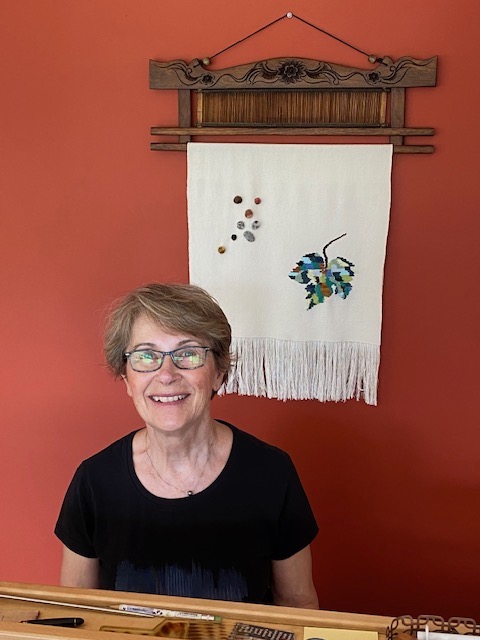 "I was always interested in aromas and had a fascination for food and cooking."
"I was always interested in aromas and had a fascination for food and cooking."
Okanagan's first lead woman winemaker, Lynn Bremmer, also an accomplished weaver, was born in the Kootenay region of BC and followed the Sensory Pathway to wine. She attended the BC Institute of Technology in 1972 to study biological sciences and food processing and said she regretted that no winemaking courses were available in BC at the time. She worked for a year in the dairy industry and then held a lab position at Andrés Wines in Port Moody, where she was mentored by its winemaker. She left in 1980 to take on the lead winemaking position with Brights Wines in Oliver, a winery established by Lynn and her spouse, a viticulturist whom she had met while working at Andrés Wines. Brights Winery was instrumental in developing premium BC-grown vinifera varietals imported from Europe. They evaluated over 50 varietals known to be sources of high-quality wines.
(Lynn Bremmer)
Lynn and her spouse later established Mount Kobau Wine Services in Oliver, through which they continue to serve others in the industry. For example, they developed curricula for, and later taught, enology and viticulture courses at Okanagan College, now the University of British Columbia Okanagan (UBC Okanagan). They also were involved in overseas projects for the Canadian government designed to bring modern winemaking techniques to eastern Europe and the Caribbean, served on the Research and Development committee of the BCWI and were instrumental in the development of the VQA regulations for BC. Lynn, a past chair of the BC Wine Grape Council, continues to assist the local wine industry in myriad ways, and is a mentor for many in the industry.
Climate/opportunities for women. Lynn identified several changes that she thought further supported and benefitted women's participation, and brought increased visibility and recognition to the region. Most notably are the Viticulture and Wine Studies programs offered at UBC Okanagan, and the Wine Research Centre now headquartered on that campus. The Centre develops initiatives that support research and education in viticulture and other fields. She noted that the world-renowned scientists at the Summerland Research and Development Centre located in the Okanagan also have focused attention on the viticulture and winemaking challenges in the area. In addition, an extensive Centre for Food, Wine and Tourism is being constructed at the Okanagan campus. Among its goals are supporting "homegrown education in culinary arts, and local food and beverage production."
Valeria (Val) Tait
Viticulture is Val's passion but she followed the Sensory Pathway to wine. "It is here that one can feel an authentic process."
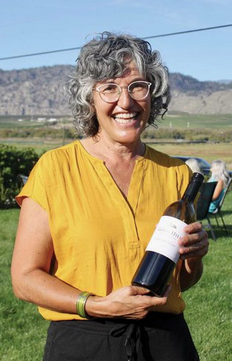 Winemaker and General Manager at Gold Hill Winery in Oliver and co-owner of 2house Winery, Valeria (Val) Tait is known for crafting a wide range of white and red wines. She completed her undergraduate degree in Molecular Genetics and Plant Biochemistry at Simon Fraser University, and went on to study Enology and Viticulture at the University of California, Davis, in 1995. She learned early on that she did not like working in a lab and sought out vineyard and consulting work instead, as she "loves the challenges they invariably bring with them." Her spouse, also a winemaker, founded Poplar Grove Winery, in 1993, where she was a consulting viticulturist for many years. The winery was sold to another family in 2007, but Val continued as its consultant before moving to Bench 1775, in 2013, as its general manager and winemaker. In 2020, she accepted the lead winemaking position at Gold Hill Winery, where she was "attracted to the exceptional growers who are the owners and their focus on Cab Franc."
Winemaker and General Manager at Gold Hill Winery in Oliver and co-owner of 2house Winery, Valeria (Val) Tait is known for crafting a wide range of white and red wines. She completed her undergraduate degree in Molecular Genetics and Plant Biochemistry at Simon Fraser University, and went on to study Enology and Viticulture at the University of California, Davis, in 1995. She learned early on that she did not like working in a lab and sought out vineyard and consulting work instead, as she "loves the challenges they invariably bring with them." Her spouse, also a winemaker, founded Poplar Grove Winery, in 1993, where she was a consulting viticulturist for many years. The winery was sold to another family in 2007, but Val continued as its consultant before moving to Bench 1775, in 2013, as its general manager and winemaker. In 2020, she accepted the lead winemaking position at Gold Hill Winery, where she was "attracted to the exceptional growers who are the owners and their focus on Cab Franc."
(Val Tait)
2house, founded in 2020, is a collaborative venture for Val and her spouse, and a return to their first love of growing grapes and making small lots of wine distinctive of place, namely South Okanagan. The fruit is sourced from single vineyards that are part of Gold Hill Winery.
We were fortunate to have the opportunity to taste her excellent Gold Hill 2020 Cabernet Franc and her 2house 2018 Chardonnay and 2017 Tempranillo. All three wines have received high praise. Among Val's many awards and accolades is being named "the vine whisperer" for Poplar Grove's 2008 Syrah earning a gold medal from Decanter Magazine World Wine Awards.
Climate/opportunities for women. In addition to having a very supportive consumer base, family-owned wineries, in Val's experience, are particularly welcoming of women winemakers and more accommodating to work-life balance. Her advice to young women is to be bold and take on challenges. "Education is super important, as are working harvests, international experience, and showing enthusiasm for your work."
Karen Gillis née Yeung
"I have a passion for sensory science, and embrace the opportunity to travel the world through my taste buds and the lens of wine."
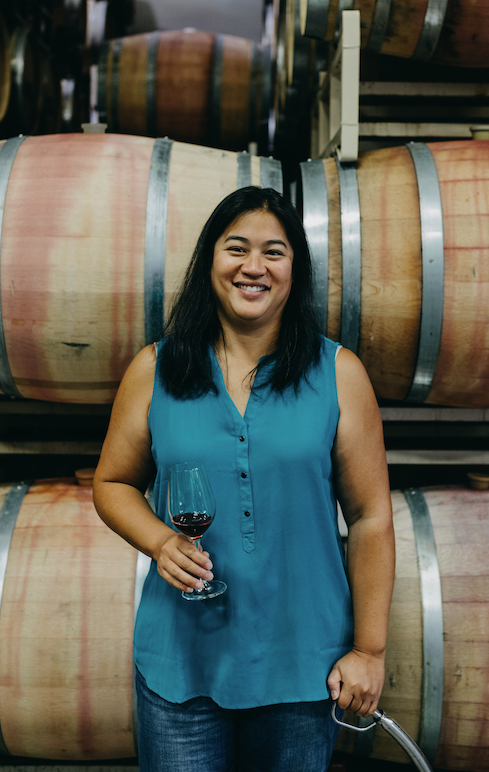 A person who loves new challenges, Karen Gillis is now Vineyard Operations Manager BC for Andrew Peller Limited, having previously held lead winemaking positions with Andrew Peller. She is very positive about Andrew Peller as an employer and appreciates the opportunity it provides to learn and develop as a wine professional.
A person who loves new challenges, Karen Gillis is now Vineyard Operations Manager BC for Andrew Peller Limited, having previously held lead winemaking positions with Andrew Peller. She is very positive about Andrew Peller as an employer and appreciates the opportunity it provides to learn and develop as a wine professional.
(Karen Gillis)
Born and raised in Vancouver by parents who had immigrated from Hong Kong, Karen was encouraged to consider culinary school, but instead completed a Diploma in Food Technology from the BC Institute of Technology in 1996. She then worked several years in the food and beverage industry before accepting a position with Andrés Wines in Port Moody as its assistant winemaker.
She continued her career in the Okanagan after Andrew Peller purchased wineries there. First transferring to Kelowna, where she was responsible for Calona Vineyards, she then moved to Red Rooster in Penticton as head winemaker in 2006. The senior winemaker for Andrew Peller was an important mentor during her time there. In 2019, Karen accepted her current position with Peller, working with growers and becoming more directly involved in grape growing and managing vineyards.
She was known for producing many excellent wines at Red Rooster. Her Pinot Gris, for example, received a double gold at the 2012 All Canadian Wine Championship.
Climate/opportunities for women. Karen gives all pluses to the lifestyle in the Okanagan. She finds that the valley provides a caring environment, is a beautiful place to live and work, and is a place where "people do not lead with gender."
Pénélope Roche
"Passion for the sensory brought me to winemaking. We never do any analyses. We taste the grapes to decide on picking."
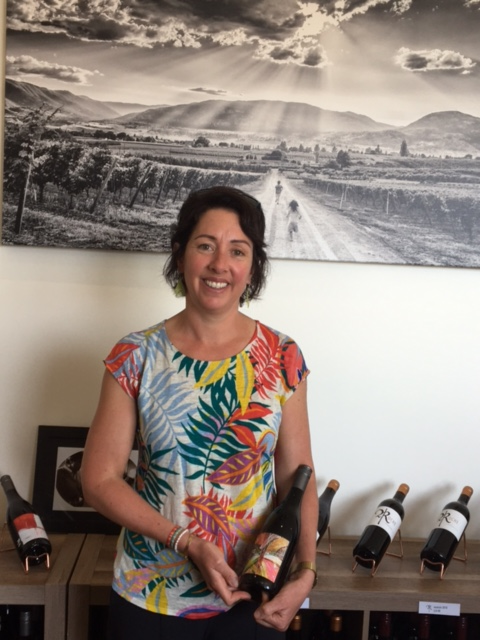 Proprietor/Winemaker for Roche Wines, Pénélope Roche grew up in France, steeped in the French tradition of winemaking, and describes herself as a "vine whisperer." Her first loves are cooking and gardening. She studied oenology in Bordeaux, graduating in 2004, and made wine in Spain and then New Zealand, where she met her future husband, who was from Vancouver. He had moved to Beaune to complete a diploma in viticulture and winemaking and then relocated to Bordeaux.
Proprietor/Winemaker for Roche Wines, Pénélope Roche grew up in France, steeped in the French tradition of winemaking, and describes herself as a "vine whisperer." Her first loves are cooking and gardening. She studied oenology in Bordeaux, graduating in 2004, and made wine in Spain and then New Zealand, where she met her future husband, who was from Vancouver. He had moved to Beaune to complete a diploma in viticulture and winemaking and then relocated to Bordeaux.
(Pénélope Roche)
When her family sold the family château and vineyard property in 2010, Pénélope and her spouse decided to move to the "beautiful Okanagan region where the wine industry was growing," a decision supported by her parents, and where friends interested in winemaking had relocated. They have no regrets about their decision, and have found that the quality of life is different from that in France: "There is a sense of freedom here. The Okanagan Valley is welcoming for women, and not judgmental."
The white and red wines of Roche consistently receive recognition in the form of British Columbia Lieutenant Governor's Awards (BCLGA) and the Great Northwest Invitational Wine Competition. The Roche 2018 Château, a Bordeaux red blend that we had the pleasure of tasting, was named a Best of the [Naramata] Bench finalist.
Climate/opportunities for women. Work and family issues can be challenging (they have three school-aged children) and being a family-owned winery is double-edged, as one "constantly needs to set boundaries to protect oneself and remember to engage in self-care." In her experience, people come back to live and work in the Okanagan after completing their education because they are attracted by the lifestyle, beauty of the lakes, outdoor activities, and the sense of community. "People choose to live here."
Nadine Kinvig
"I go on flavor, creating the aromatics and flavors."
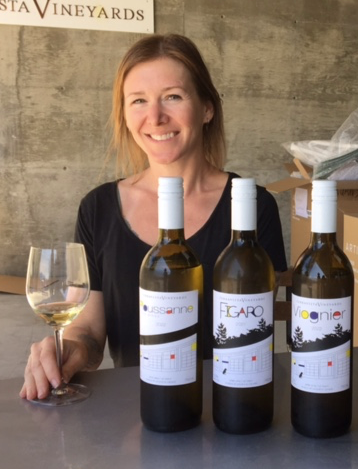 The Winemaker at Terravista Vineyards in Penticton is Nadine Kinvig. A petite person, she grew up doing lots of physical labor at her parents' equestrian center in North Vancouver. Her plan was to pursue her interest in science through the field of medicine, but working a part-time job during college at a wine store piqued her interest in wine. She discovered that she had a "super palate" and decided to explore winemaking as a career path. She moved to the Okanagan in 2004 to enroll in the Assistant Winemaker program at Okanagan College and worked a harvest.
The Winemaker at Terravista Vineyards in Penticton is Nadine Kinvig. A petite person, she grew up doing lots of physical labor at her parents' equestrian center in North Vancouver. Her plan was to pursue her interest in science through the field of medicine, but working a part-time job during college at a wine store piqued her interest in wine. She discovered that she had a "super palate" and decided to explore winemaking as a career path. She moved to the Okanagan in 2004 to enroll in the Assistant Winemaker program at Okanagan College and worked a harvest.
(Nadine Kinvig)
Knowing she would need more credentials to pursue a career in winemaking, on the recommendations of colleagues, she moved to New Zealand and obtained a Bachelors Degree of Viticulture and Oenology from Lincoln University in 2007. There were very few women in her class. She then returned to the Okanagan and married a fellow winemaker.
Finding a full-time position in the wine industry turned out to be challenging. She persisted at various part-time positions and became the assistant winemaker at Poplar Grove Winery in 2010 before moving to a winemaking position at Time Winery. In 2019, she joined Terravista Vineyards as its winemaker, where she crafts small-lot specialty white wines, including Spanish varieties.
Nadine has received many accolades over the years. Her first awards with Terravista Vineyards include the prestigious BCLGA platinum medal for her 2019 Albariño, silver for the 2019 Fandango, and bronze for the 2019 Viognier. Most recently, her 2021 Figaro was awarded a gold medal by the 2023 BCLGA. The wines she enjoys making the most are aromatic, fresh, and clean white wines with a backbone of minerality and acidity.
Climate/opportunities for women. Nadine sees women today as more career oriented, and as a growing wine region, the Okanagan offers them great opportunities. She noted that work and family issues are challenging (she has two school-aged children) and that her own parents have been totally supportive of her career path. Her advice to younger women: Do more harvests and get your hands dirty. "Earning a degree in a wine-related field is especially important today when the field is very competitive."
Amber Pratt
"Sensory brought me to love wine, agronomy told me that I was capable."
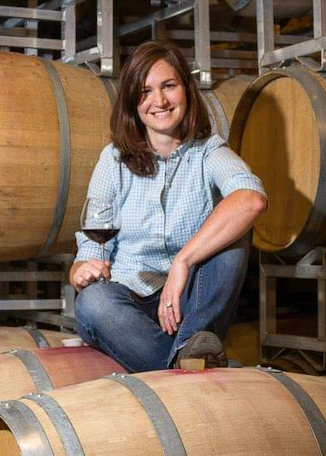 Amber Pratt, the Winemaker for Moraine Estate Winery, grew up on Vancouver Island in a family with a passion for gardening. She found herself loving horticulture while still in high school. After studying horticulture and working in the landscape and nursery industry for a number of years, her background and curious nature led to enrolling in Wine & Spirit Education Trust (WSET) courses at the Art Institute of Vancouver in 2008 (see Note 3). "Literally, a new world opened to me."
Amber Pratt, the Winemaker for Moraine Estate Winery, grew up on Vancouver Island in a family with a passion for gardening. She found herself loving horticulture while still in high school. After studying horticulture and working in the landscape and nursery industry for a number of years, her background and curious nature led to enrolling in Wine & Spirit Education Trust (WSET) courses at the Art Institute of Vancouver in 2008 (see Note 3). "Literally, a new world opened to me."
(Amber Pratt)
Amber moved to Penticton in 2009 to enroll in the viticulture and enology courses being offered at Okanagan College, and took positions in a tasting room and then in the cellars at Road 13 and Black Hills wineries in the South Okanagan. She accepted the winemaker position at C.C. Jentsch Cellars in 2013, where she garnered several prestigious awards for her work with Syrah, Malbec, and Bordeaux varietals; these included the Regional Trophy for Best Red Wine in North America at Decanter Asia in 2015.
Joining Moraine Estate Winery in 2019, Amber continues crafting award-winning wines. Her 2021 Malbec received a platinum medal from the BCLGA, with her 2020 Syrah and 2021 Pinot Noir garnering gold and silver medals, respectively. A few years after Amber's appointment as winemaker, Moraine Estate was named among the Top 10 Small Wineries and Top 25 Wineries in Canada in the National Wine Awards of Canada WineAlign Competition.
Climate/opportunities for women. Amber finds the Okanagan, and British Columbia in general, as respectful and accepting of different world views, which she personally appreciates. In addition, compared to other equally attractive, major wine regions with good employment opportunities, it is a less expensive place to live and raise a family (she and her spouse have four school-aged children).
Keira LeFranc
"My pathway was Sensory. I started in restaurants and in the sommelier world, particularly the pairings of wine and food."
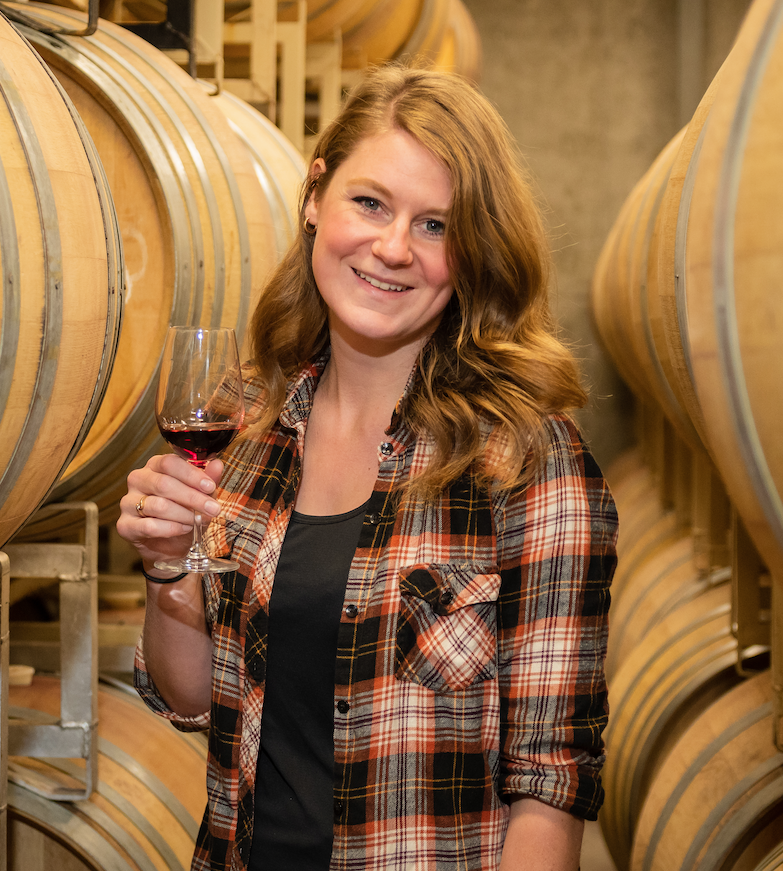 Born and raised in Penticton, Keira LeFranc is Winemaker and Director of Operations for Stag's Hollow Winery. Keira always pursued science and earned a degree in Biological Sciences with a Physical Sciences minor at the University of Alberta in 2013. While still in college, she worked in the tasting room of Stag's Hollow Winery in the summer of 2012, and the next year worked in the lab and participated in harvest. "I loved the work but was overwhelmed by the responsibilities involved and decided to move to the restaurant side of things."
Born and raised in Penticton, Keira LeFranc is Winemaker and Director of Operations for Stag's Hollow Winery. Keira always pursued science and earned a degree in Biological Sciences with a Physical Sciences minor at the University of Alberta in 2013. While still in college, she worked in the tasting room of Stag's Hollow Winery in the summer of 2012, and the next year worked in the lab and participated in harvest. "I loved the work but was overwhelmed by the responsibilities involved and decided to move to the restaurant side of things."
(Keira LeFranc)
Keira relocated to Australia in 2014 and worked in restaurants and presented programs focused on wine education. Finding that she missed pursuing science, she went back to school and completed her Postgraduate Diploma of Wine Science at the University of Auckland, in New Zealand. After graduating, she first worked as a Harvest Cellar Hand at Babich Winery's Auckland facility for their 2017 harvest and then returned home to Stag's Hollow as a Cellar Hand for the 2017 harvest there. When harvest was completed, the then winemaker gave the winery a nine-month notice, and he subsequently recommended Keira for the lead winemaking position. She accepted, overlapped with him for those nine months, and took over as winemaker in July 2018. The fantastic harvest that year provided Keira with what she described as a career highlight: "Six wines in the 2018 Renaissance Series," a designation that is possible only when the wine is crafted from outstanding grapes.
Since her appointment, the winery has been named one of Canada's Top 10 Small Wineries. Most recently, Keira was among the five individuals named to the "2023 International Wine & Spirit Competition Emerging Talent in Wine" shortlist.
Climate/opportunities for women. Keira noted two areas of importance. The first is the presence of local Viticulture and Wine Studies programs such as those offered at UBC Okanagan—the programs provide visibility to careers in the wine industry; when Keira was in high school, she did not know winemaking was a career option. The second is the positive influence of Human Resource initiatives and Equal Employment Opportunity programs on the work culture (e.g., one sees older people working in the tasting rooms and more women in the cellar). With regard to advice, a strong science background, experience with tastings and pairings, and being passionate about wine are all crucial.
The Enology Pathway: Coming to love wine while studying the science of winemaking
Kathy Malone
"I love science! In high school and college, I did not know that winemaking was a scientific career."
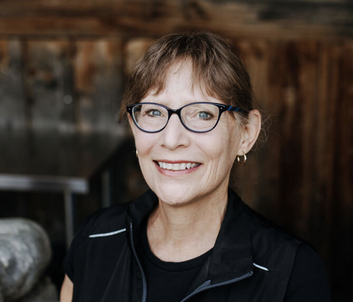 Kathy Malone, Winemaker at Hillside Winery in Penticton, was raised in the mountains of Vermont but moved with her parents to Victoria, BC, in 1973. She started university there as an English honors major, then traveled for two years. Upon returning, she focused on the sciences as part of a co-op program. The winemaker who interviewed her for a work term within this program, and who later became her first mentor, provided an introduction to wine appreciation and fine wine.
Kathy Malone, Winemaker at Hillside Winery in Penticton, was raised in the mountains of Vermont but moved with her parents to Victoria, BC, in 1973. She started university there as an English honors major, then traveled for two years. Upon returning, she focused on the sciences as part of a co-op program. The winemaker who interviewed her for a work term within this program, and who later became her first mentor, provided an introduction to wine appreciation and fine wine.
(Kathy Malone)
Using her science background, Kathy accepted a position as a lab technician at Mission Hill Family Estate in West Kelowna in 1985. She continued working there in various winemaking-related positions until 2008, when she was appointed to the lead winemaking post at Hillside Winery. Kathy said, "I had total confidence in the winemaking part of the position. The Chief Winemaker during most of my time at Mission Hill had been a terrific boss and good mentor." Kathy is very active in the BC wine industry, having served on the BC Wine Grape Council, among other roles. She uses her "Winemaker's Blog Series" to share information she gathers on such topics as Sustainability and Resilience.
Hillside has a uniquely designed winery that allows the wine to ferment and age in many small batches to maintain the varietal character and integrity of each type of grape and vineyard. Kathy's 2021 Heritage Viognier recently received a prestigious BCLGA platinum medal, and her 2022 Gewürztraminer a gold award. Hillside is also noted for Mosaic, its signature red, a classic blend of Bordeaux varieties sourced from prime vineyard blocks along the Naramata Bench.
Climate/opportunities for women. Kathy sees the Okanagan as still being in a dynamic phase that offers opportunities for women to advance in the industry. With regard to advice, she believes a science background is critical, as is having practical knowledge. Working at smaller wineries has the advantage of providing the opportunity to learn all of the elements of winemaking, as compared to larger facilities where an employee is assigned to a narrower range of tasks.
Severine Pinte
"It was at school that I discovered viticulture and enology."
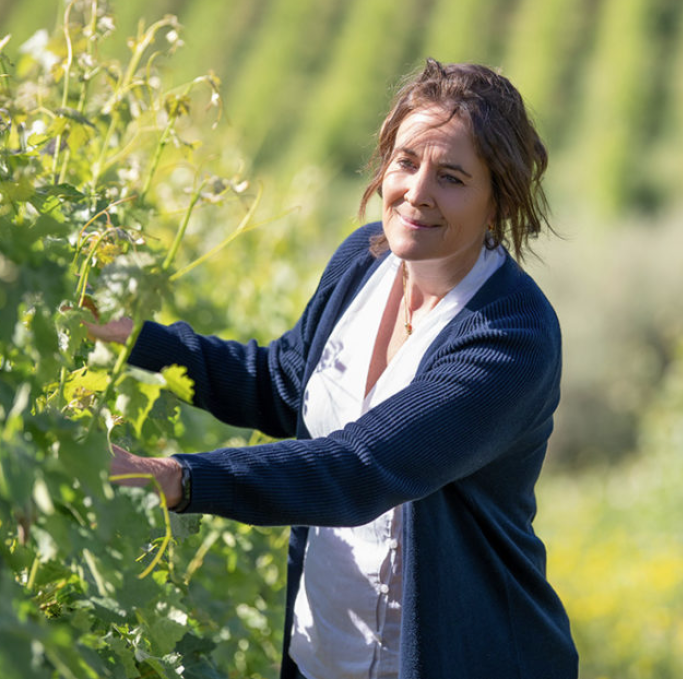 A highly respected and well-known winemaker in the Okanagan Valley, the French-born and educated Severine Pinte told us that relocating to the Okanagan was a great move for her and allowed her to blossom as a winemaker. Severine is now the Executive Winemaker and Viticulturist and Managing Partner for Enotecca Winery and Resorts.
A highly respected and well-known winemaker in the Okanagan Valley, the French-born and educated Severine Pinte told us that relocating to the Okanagan was a great move for her and allowed her to blossom as a winemaker. Severine is now the Executive Winemaker and Viticulturist and Managing Partner for Enotecca Winery and Resorts.
(Severine Pinte)
Severine's father was quite interested in wine and often took the family out for barrel tasting, but it was at school that she discovered viticulture and enology and changed her plans of becoming a pilot. She attended ENSAM (Ecole Nationale Superieure Agronomique de Montpellier) and completed her Masters in Viticulture and Oenology as well as her National Enology Diploma there in 1998. She worked for a number of years in the wine industry, "learning from the bottom up" about every task in a winery, from winemaking to vineyard management, which has proved to be very useful. She also learned how male-dominated the industry was at that time. "Compared to France, it is so much easier here."
In 2010, Severine and her family moved to the South Okanagan area where she accepted the lead winemaking position at Enotecca, a parent company that owns two sister wineries, LaStella in Osoyoos and Le Vieux Pin in Oliver. She became Managing Partner in 2015, and Executive Winemaker/Viticulturist in 2023. The grapes for her wines are sourced from nine properties spread throughout the valley, with those for Le Vieux Pin tending to be from the more northerly and cooler region and those for La Stella from further south. All nine vineyards are quite different, making the role of winemaker both interesting and challenging.
Severine has a stellar record of crafting notable wines at both wineries and is also active in the BC wine community as a mentor and educator. She has chaired the Sustainable Winegrowing Group for BC since her election to that position in 2020 and also serves on the BC Wine Grape Council Board of Directors. LaStella winery, Le Vieux Pin winery, and all nine vineyards earned sustainable certification in 2021. Among her many recognitions is a 2023 award from the French government, which just named Severine to one of its highest honors in the field of agriculture, the prestigious "French Knight Medal Order of Agricultural Merit."
Climate/opportunities for women. Severine views BC "as a good place to be." It is a growing wine region with great terroir and where the land is treated with respect.
Stephanie Stanley
"At heart, I am a scientist."
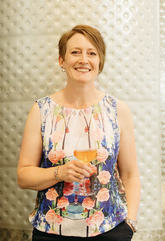 Stephanie Stanley is the Winemaker at Peak Cellars in Lake Country. Born and raised in the Okanagan to parents of German heritage, she had the good fortune to travel to Germany after her second year at Okanagan University College to take a job with friends of her parents. This was just before her third year in university when she needed to decide how to focus her science interests. After she returned from Germany that summer, "a lightbulb went off" as she remembered the wine festivals she had attended and now missed: "I knew that I wanted to be a winemaker." Okanagan University College had just started a joint program with Brock University in Ontario, and she was able to complete her BSc with Honors from Brock University's Cool Climate Oenology and Viticulture program in 2003.
Stephanie Stanley is the Winemaker at Peak Cellars in Lake Country. Born and raised in the Okanagan to parents of German heritage, she had the good fortune to travel to Germany after her second year at Okanagan University College to take a job with friends of her parents. This was just before her third year in university when she needed to decide how to focus her science interests. After she returned from Germany that summer, "a lightbulb went off" as she remembered the wine festivals she had attended and now missed: "I knew that I wanted to be a winemaker." Okanagan University College had just started a joint program with Brock University in Ontario, and she was able to complete her BSc with Honors from Brock University's Cool Climate Oenology and Viticulture program in 2003.
(Stephanie Stanley)
Stephanie held several cellar, harvest, and research positions during the course of her studies. From these experiences, she learned that despite her strong interest in science, research was not the direction she wanted to go for a career. After graduating, she took a one-year position at Sandhill Wines in 2003, an Andrew Peller winery, filling in for a person on maternity leave. She then was offered a full-time position as a winemaker, a role that she held there for over 10 years. "Still feeling a deep-seated desire to travel the world to make wine and learn more," Stephanie and her spouse moved to New Zealand in 2015. For the next four years she travelled back and forth working vintages in New Zealand's Marlborough Region and in the Okanagan. Stephanie accepted an assistant winemaker position at Peak Cellars during this period and subsequently was named its lead winemaker, a position she has held since 2019.
When asked about her career highlights, Stephanie talked about her passion for working with Riesling and other aromatic whites. Highlights include working with the team at Sandhill Wines when it won Best Winery and Best of Class in the 2009 Canadian Wine Awards for their red and white wines, and the recent recognition Peak Cellars received at the 2023 Los Angeles International Wine Competition. The winery received six honors, including its 2021 Riesling being named Best of Class and awarded a gold medal, and the 2020 Glacial Till Pinot Gris and the 2021 Grüner Veltliner receiving a gold and silver medal, respectively.
Climate/opportunities for women. There is good opportunity in the Okanagan, and one should not be afraid to make a change. "Finding the right spouse/partner and the right winery are crucial."
Jen Oishi
"Science drew me to enology."
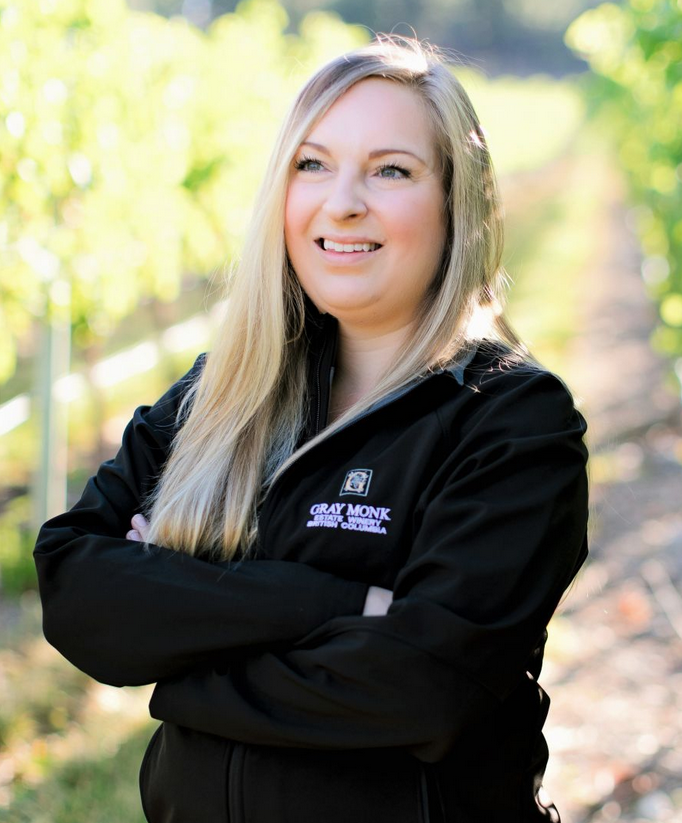 The Winemaker at Gray Monk Estate in Lake County, Jen Oishi started her career at Gray Monk Estate and is still there. She applied for an interim lab position at Gray Monk in 2012, immediately after completing her degree in microbiology from the University of British Columbia, and "never left." She was promoted to assistant winemaker in 2015. Continuing to work closely with Gray Monk's previous winemaker, who was an excellent mentor, she was appointed lead winemaker in 2020.
The Winemaker at Gray Monk Estate in Lake County, Jen Oishi started her career at Gray Monk Estate and is still there. She applied for an interim lab position at Gray Monk in 2012, immediately after completing her degree in microbiology from the University of British Columbia, and "never left." She was promoted to assistant winemaker in 2015. Continuing to work closely with Gray Monk's previous winemaker, who was an excellent mentor, she was appointed lead winemaker in 2020.
(Jen Oishi)
Jen mentioned that one of her goals as winemaker is to "keep the previous owners' traditions alive." The previous owners, George and Trudy Heiss, were the first to plant the Pinot Gris vine, a vinifera varietal, in Canada with Gray Monk Estate subsequently becoming known for producing fruit-forward white wines.
When we asked Jen if she had had time as winemaker for any career highlights, the normally understated Jen lit up and said I "hit a home run" with a new wine, the Gray Monk Odyssey Chardonnay; we had the pleasure of tasting its first two vintages, 2021 and 2022, and found them both to be excellent examples of the varietal.
Climate/opportunities for women. Both Jen's and her spouse's families live in the area, and they receive good support with childrearing from both families. She is very positive about the opportunities for women in the Okanagan. Her advice to others is to be bold, work harvests, complete WSET courses, and "get out and taste."
The Science/Agronomy Pathway: Coming to love wine from a grounding either in Science or Agronomy
Corrie Krehbiel
"Five years of university for this!" her father exclaimed on seeing Corrie covered in lees (sediment that forms during wine fermentation).
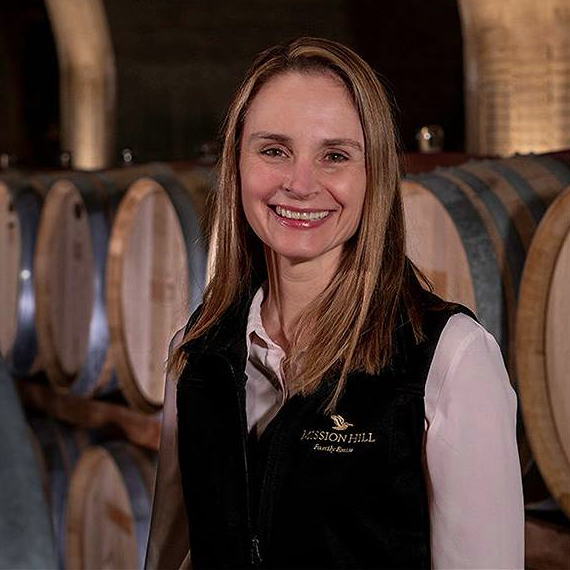 The Chief Winemaker at Mission Hill Family Estate in West Kelowna, Corrie Krehbiel, always loved agriculture. Her parents were a third-generation fruit-growing family. She also loved science. While still in high school, she was offered a job on the bottling line of a winery, and this led to a series of jobs at Cedar Creek Estate Winery that she greatly enjoyed. Ann Sperling was the winemaker at Cedar Creek and seeing a successful woman in this role altered Corrie's mindset about a future career. There were no enology programs in the Okanagan at the time, and, after initially considering medicine, Corrie decided to complete the Food Science Bachelor of Science Honors program at the UBC. To further her background in winemaking, she opted for the Viticulture and Enology program at Lincoln University in New Zealand, choosing it over UC Davis because of the more practical orientation of its curriculum. She graduated in 1998.
The Chief Winemaker at Mission Hill Family Estate in West Kelowna, Corrie Krehbiel, always loved agriculture. Her parents were a third-generation fruit-growing family. She also loved science. While still in high school, she was offered a job on the bottling line of a winery, and this led to a series of jobs at Cedar Creek Estate Winery that she greatly enjoyed. Ann Sperling was the winemaker at Cedar Creek and seeing a successful woman in this role altered Corrie's mindset about a future career. There were no enology programs in the Okanagan at the time, and, after initially considering medicine, Corrie decided to complete the Food Science Bachelor of Science Honors program at the UBC. To further her background in winemaking, she opted for the Viticulture and Enology program at Lincoln University in New Zealand, choosing it over UC Davis because of the more practical orientation of its curriculum. She graduated in 1998.
(Corrie Krehbiel)
As Corrie noted during our conversation, "it is all about loving what you do." She worked as an assistant winemaker, associate winemaker, and winemaker at well-known wineries for the next several years after graduating, completed her MBA, and then held a winemaker position at Cellar Tek Supplies, where she provided technical support for BC winemakers and consulted worldwide. In 2015, Corrie accepted a winemaker position at Mission Hill Family Estate, where she worked with the then chief winemaker who became an important mentor. She was promoted to Chief Winemaker in 2020, and is the first Canadian and first woman to hold this position.
Mission Hill is known for quality wines. Corrie introduced us to several wines in its Legacy Series: the 2020 Perpetua, a single vineyard Chardonnay, and the 2017 Compendium, a dense red blend crafted from Cabernet Sauvignon, Merlot, and Cabernet Franc. Also in this series is the highly regarded Oculus, a Bordeaux-style blend made from South Okanagan fruit.
Climate/opportunities for women. Corrie thinks the environment for lead winemaking jobs in the Okanagan is becoming increasingly competitive as the region is recognized for its quality, and winemakers from other countries are drawn to the potential of the valley. She sees that woman seeking positions in production are competing effectively, becoming more self-confident, and asking the right questions about challenges. Her advice is to learn from setbacks, stay focused on your goals and your legitimate place in the industry, have a science background, get experience, especially in the cellar, and ask for more experiences/responsibilities to move up in an organization.
Factors Related to Women Winemakers' Continued Presence in the Okanagan
In terms of percentages, the women winemakers in the Okanagan Valley have held their own over the past 30 years and have continued to distinguish themselves as winemakers and industry leaders. They had all followed one of the Career Pathways identified in our book, Women Winemakers: Personal Odysseys, and now hold a lead winemaker position at a well-known family-owned or corporately-held winery. Without exception, they are personally inspiring, passionate about their work, and love what they are doing.
We now turn to factors that help account for their current strong presence.
Loving the Okanagan Valley
Most of the winemakers we interviewed had grown up in the BC region, although many had traveled to other regions or countries to obtain degrees or credentials in their fields. Loving the region, having strong family ties, and wanting to make a life there, attracted many of the women we met to employment in the Okanagan Valley. As Pénélope Roche noted, "People choose to live here."
Having Visibility, Opportunity, and Leadership within the Industry
1. Visibility comes with women holding the first lead winemaking position at a prominent winery.
Severine Pinte was appointed as the first lead woman winemaker at Enotecca in 2010 and is now its Executive Winemaker and Viticulturist, and Corrie Krehbiel is the first Canadian and the first woman to be appointed Chief Winemaker at Mission Hill Family Estate in 2020. People in the industry noticed.
2. The opportunity provided in a growing industry "for moving up" without significant geographic relocation.
One winemaker used the term, "winemaker shuffle," to describe how one person's moving to a more desired or challenging position leaves the position open for someone else seeking to make a change. The Okanagan is perhaps uniquely suited to this kind of "shuffle," given the dramatic increase in the number of wineries in a relatively short period of time and its relatively small geographic area. Several winemakers now holding lead winemaker positions described moving several times within the Okanagan to gain valuable experience, knowledge, and increased responsibility. Examples include Amber Pratt and Nadine Kinvig.
3. Leadership within the industry brings recognition, opportunity, and the potential for positive change.
Sandra Oldfield, the co-owner of the consulting company Elysian Projects Inc., and the former Chief Executive Officer of Tinhorn Creek Vineyards in Oliver, provides a stellar example of visionary leadership. An expert in the area of Human Resources, Sandra is well known for her focus and dedication to occupational safety and to equitable opportunity within the industry. While serving as Tinhorn's CEO, she developed and implemented unparalleled health and safety programs. Several lead winemakers with whom we spoke commented on the positive influence of HR programs and EEO policies in their own organizations and on the work culture in the Okanagan.
Many of the winemakers we interviewed spoke positively about serving in various leadership positions. Having prominent women winemakers involved makes women's presence in the industry more visible and enhances their opportunities for networking. Lynn Bremmer, Okanagan's first lead woman winemaker, is a past chair of the BC Wine Grape Council Board of Directors, for example. Importantly, Mary McDermott, the celebrated lead Winemaker at Township 7 Vineyards & Winery on the Naramata Bench, currently serves on the Board of Directors. Severine Pinte is also a member of this Board.
Mentoring
Having talent, ability, and passion recognized early in one's career by an esteemed mentor can be crucial to a successful career path. Stephanie Stanley and Kathy Malone, among others, received valuable mentorship from a senior winemaker at the winery where they were employed. One name mentioned to us more than once was that of Howard Soon, a senior winemaker from 1980 to 2017 for Andrew Peller's family of wineries; he is now the master winemaker at Vanessa Vineyard in Similkameen Valley, which parallels the Okanagan. Indeed, Karen Gillis, for whom he also was a mentor, commented that "Howard was a mentor for half the valley." In 2021, he was awarded the prestigious Canadian Winemaker of the Year Award in recognition of his expertise, vast experience, and his passion to elevate others through mentorship.
Gina Fernandes Harfman, Nostalgia Wines' exuberant and successful Owner/Winemaker with whom we were able to meet only briefly, talked about the business challenges associated with winery ownership and the importance of receiving mentoring as a winery owner/winemaker. Gina was helping with crush at Nostalgia Wines (then called Oliver Twist) in 2010, and was an assistant winemaker at another winery, when its owners offered to sell her the winery; Gina took over as the sole owner in 2012, at the young age of 32.
Another aspect of successful mentoring is illustrated in the career pathway of Jen Oishi, who is now the lead winemaker at the winery where she started her wine career. Jen was mentored by Gray Monk's well-known male senior winemaker from the time she was hired into a lab position up until her appointment as winemaker. Having a successful lead male winemaker identify, hire, and mentor a talented young woman viewed as having the potential to be the next lead winemaker represents progress for women entering a male-dominated field.
Ongoing Challenges
All is not perfect, of course. The women we interviewed have a good understanding of the challenges associated with working in this male-dominated industry and recognize the presence of discriminatory behavior. When asked about the biggest career obstacles they needed to overcome, a common response was, "breaking stereotypes of a woman's capabilities in the wine industry—not just related to winemaking, but also in grape growing." Several women noted needing "to work twice as hard as male colleagues to prove themselves," especially early in their careers, and walking a fine line so as not to threaten others with their competence. Others mentioned that there is still a perception that men are the winemakers, especially among those not in the wine industry, and this perception can make it harder for women to picture themselves as having a legitimate place as they pursue this role.
The availability of good child care, especially during harvest, and achieving a satisfactory work and family balance are well-known challenges in the industry. Nadine Kinvig and Jen Oishi both spoke of the importance of having supportive family living nearby. Amber Pratt further noted the importance of having a partner who shares in the day-to-day household and parenting responsibilities and tasks.
Finally, the challenges associated with Mother Nature and climate change came up in all our conversations. Most recently, extremely cold weather shortly after completion of the 2022 harvest severely damaged the vines, resulting in what is likely to be a significantly diminished harvest for the 2023 vintage, with an estimated replanting of as much as 29% of the province's vineyards.
Concluding Comments
Our interviews and research provide an important snapshot of the Okanagan Valley today. Although the Valley's wine industry remains male-dominated, it is reassuring to find that its women winemakers are holding their own—some 20% of the wineries have a lead woman winemaker today, similar to three decades ago. That senior male winemakers have successfully mentored women for these important roles is also noteworthy.
The various pathways to winemaking that we described made immediate sense to the winemakers and for many, brought a deeper understanding of their past decisions and what fuels their passion as a winemaker. Moreover, the absence of the family pathway among those we interviewed provided further validation for the pathway typology. The Okanagan is far too young a wine region for a person to "come to love wine while growing up in a winery family."
We highly recommend traveling to the Okanagan Valley to experience its impressive beauty, meet with its talented winemakers, and enjoy their excellent and unique wines. Finding their wines outside of BC is a challenge, however, because residents of British Columbia are first in line whenever a vintage is released!
Notes
The opening photo is courtesy of Decanter magazine, and the Okanagan Valley map is courtesy of the Wine Growers British Columbia Society. Content for the article came from our conversations with winemakers and others in the industry, and information and resources they provided about the Okanagan Valley wine region. Both the staff at Wines of British Columbia and its extensive website were particularly informative.
1. The wineries included were those listed on the Wines of British Columbia website and in the Wine Business 2023 Directory Buyers Guide for British Columbia. We used winery websites and phone calls to wineries to identify a winery's lead winemaker.
2. Our most recent study found that the overall percentage of CA wineries with lead women winemakers to be 14%. The percentages differed by CA wine region with the highest being 17% for Sonoma/Marin and the Southcentral Coast.
3. The Wine & Spirit Education Trust (WSET) is the largest global provider of wine, spirits and sake qualifications.
Author Bios: Lucia Albino Gilbert, Ph.D., and John C. (Jack) Gilbert, Ph.D., both Professors Emeriti, have had long and distinguished careers at The University of Texas at Austin and Santa Clara University and are widely published in their fields. Their research on facilitating women's career success in male-dominated scientific fields such as winemaking combines Lucia's academic field of Psychology and John's academic field of Organic Chemistry. The acclaimed book, Women Winemakers: Personal Odysseys, is among their recent publications. They can be reached at [email protected]. Their research website is www.womenwinemakers.com.
